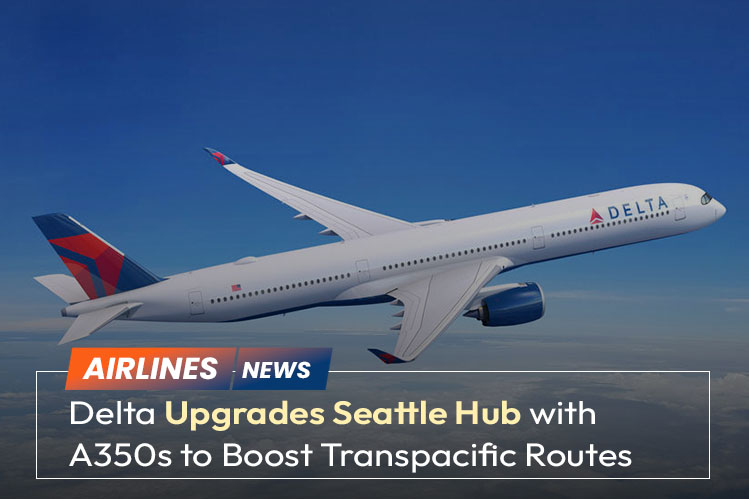Delta Airlines has announced a significant upgrade to its fleet operating out of its Seattle hub, aiming to enhance passenger experience and strengthen its market position. The airline plans to replace Airbus A330-900neo aircraft with more advanced Airbus A350-900s on three critical transpacific routes by spring 2025. This shift is part of Delta's ongoing effort to modernize its fleet and maintain a competitive edge in international aviation.
The A350-900 will be introduced on the Taipei-Taoyuan and Seoul-Incheon routes starting March 29, 2025, with the Tokyo-Haneda route following on May 23, 2025. Delta's decision reflects a commitment to providing superior travel experiences and leveraging the operational efficiency of the A350-900. The aircraft boasts improved fuel efficiency, extended range, and upgraded onboard amenities compared to the A330-900neo.
Seattle has become a pivotal hub for Delta's transpacific operations, serving as a vital gateway to Asia. By deploying the A350-900, the airline intends to solidify its position as a dominant player in the region. Delta's strategy aligns with its broader goal of maintaining leadership in a market characterized by increasing competition.
The A350-900 features several advantages over the A330-900neo, including a more spacious cabin layout and an enhanced premium passenger experience. The A330-900neo is configured with 281 seats, including 29 in business class, 28 in premium economy, and 224 in economy. In contrast, Delta's A350-900 offers a range of configurations tailored to various market demands. The standard version includes 306 seats, while the premium variant accommodates 275 passengers, with expanded business and premium economy sections. Both aircraft models feature Delta's signature Delta One Suites, though the A350-900 delivers a superior product overall.
These enhancements underscore Delta's focus on premium capacity, as the A350-900 introduces more business and premium economy seats while slightly reducing the number of economy seats. This shift reflects a broader industry trend of prioritizing premium travel offerings, particularly on long-haul routes.
Delta's decision to deploy the A350-900 also addresses increasing competitive pressures from Alaska Airlines, a major rival in the Seattle market. Alaska Airlines recently announced plans to expand its operations in Seattle, including the launch of a Tokyo Narita flight in May 2025. As Alaska seeks to transform Seattle into a global gateway, Delta must counter these moves to retain its regional dominance. "Delta's proactive approach demonstrates its determination to maintain its leadership in Seattle's long-haul market," noted an industry analyst.
In addition to responding to competition, Delta's fleet management strategy plays a key role in this transition. The airline has been acquiring additional A350-900 aircraft and reconfiguring planes previously operated by LATAM Airlines to meet its evolving market needs. These adjustments allow Delta to deploy the aircraft on more business-focused routes, ensuring a competitive product offering.
While the upgrade highlights Delta's strategic foresight, questions remain about the performance of some transpacific routes. The Taipei route, for instance, has struggled with low passenger demand and unusual business class award availability. These factors suggest that the decision to introduce the A350-900 is more about asserting market presence than addressing route performance challenges. Analysts speculate that Delta is leveraging the A350-900's premium capacity to capture a larger market share and enhance its competitive positioning.
The timing of this upgrade is significant, coinciding with Alaska Airlines' planned expansion and the delivery of new A350-900 aircraft to Delta. By aligning its fleet modernization efforts with these developments, Delta aims to stay ahead in a rapidly evolving market.
Delta's calculated moves reveal a company intent on adapting to competitive pressures while striving to improve its product offerings. As one aviation expert observed, "This fleet upgrade is a bold statement of Delta's confidence in its Seattle hub and its vision for the future of international travel."
By deploying the A350-900, Delta reaffirms its dedication to innovation and excellence in a challenging aviation landscape. Whether this strategy succeeds in boosting market share and route performance remains to be seen, but it signals Delta's determination to remain a leader in global aviation.
Read More: Delta Airlines Launches 6,223 Nautical Miles, Its 4th Longest Route

Your email address will not be published.